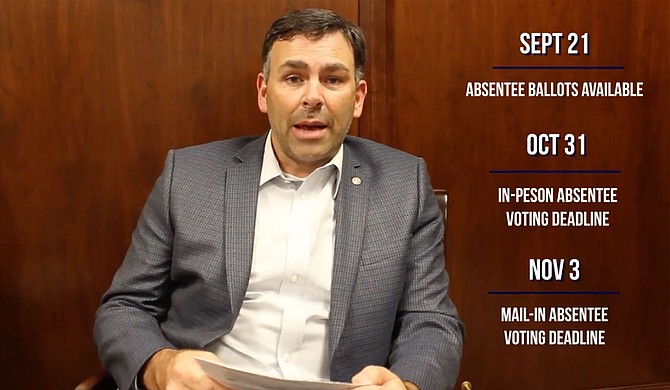Secretary of State Michael Watson (pictured) and Attorney General Lynn Fitch filed court papers Friday, responding to voting-rights groups that represent Mississippi residents with health conditions that could make in-person voting risky because of COVID-19. Photo courtesy Mississippi Secretary of State's Office
JACKSON, Miss. (AP) — Top officials in Mississippi are asking a federal judge to dismiss a lawsuit that seeks to remove some limitations from the state's absentee voting process amid the coronavirus pandemic.
Secretary of State Michael Watson and Attorney General Lynn Fitch filed court papers Friday, responding to voting-rights groups that represent Mississippi residents with health conditions that could make in-person voting risky because of COVID-19.
Watson and Fitch did not deny that the pandemic is causing health risks. But the two Republicans repeatedly denied other assertions made by attorneys from the Southern Poverty Law Center and the Lawyers' Committee for Civil Rights Under Law.
Mississippi requires absentee ballot applications to be notarized. The state also requires most people to provide an excuse to vote absentee, such as being out of town on Election Day.
The plaintiffs are asking a judge to block those two requirements, saying those are unconstitutional. They are also asking a judge to provide a clear process for what happens when election officials say they see inconsistencies in a voter’s signature.
“Defendants admit only that Mississippi state laws establishing who is eligible to vote by absentee ballot speak for themselves,” wrote a state attorney representing Watson and Fitch.
The lawsuit was filed in August on behalf of three Mississippi residents, the League of Women Voters of Mississippi and the Mississippi State Conference of the NAACP. It says Mississippi election laws could force people to choose between their health and their constitutional right to vote. It also says Watson and Fitch “have failed to take necessary steps to protect Mississippi voters’ fundamental right to vote despite the public health risks of voting in person during the COVID-19 pandemic.”
Mississippi does not allow widespread early voting. Instead, state law says absentee voting is available to anyone 65 or older, or to voters of any age who are permanently disabled or will be out of their home county on Election Day. People who have to work on Election Day when the polls are open also are allowed to vote absentee.
Legislators tweaked the law this year with provisions that expire at the end of 2020. Those allow absentee voting by someone with a temporary or permanent disability that may include “a physician-imposed quarantine due to COVID-19” or by a person who is “caring for a dependent that is under a physician-imposed quarantine due to COVID-19.”
The lawsuit in federal court is similar to one filed in state court by the American Civil Liberties Union of Mississippi and the Mississippi Center for Justice, which was also brought against Watson.
The state court lawsuit says Mississippi’s absentee voting law is confusing and could be applied inconsistently during the pandemic. A judge issued a statewide declaration Sept. 2 that would allow people to vote absentee if they have health conditions that could put them in extra danger because of COVID-19. The Mississippi Supreme Court reversed that decision Sept. 18, ruling that: "Having a preexisting condition that puts a voter at a higher risk does not automatically create a temporary disability for absentee-voting purposes."
Copyright Associated Press. All rights reserved. This material may not be published, broadcast, rewritten, or redistributed.



Comments
Use the comment form below to begin a discussion about this content.